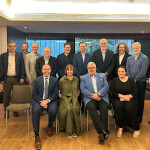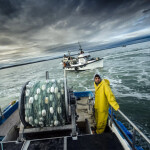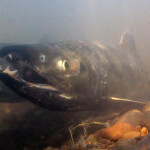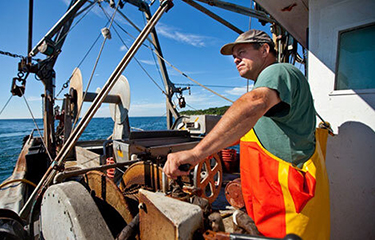Chris Brown is president of Seafood Harvesters of America and a commercial fisherman fishing out of Point Judith, Rhode Island, U.S.A. Heather Mann is executive director of the Midwater Trawlers Cooperative, a nonprofit trade association of nearly 30 fishing vessels based in Newport, Oregon, U.S.A., and a member of Seafood Harvesters of America.
Every morning, fishermen on both coasts are up early and heading out on the water in hopes of finding fish. Commercial fishing can be grueling work with long hours and unpredictable outcomes, and these days we’re seeing more uncertainty. We are witnessing big changes on the water and we need robust federal investments in science and technology for NOAA to improve data collection and fisheries management.
Just ask the snow crab fishermen in the Bering Sea. For the first time ever, the Bering Sea snow crab fishery won’t open for the upcoming season and the Bristol Bay red king crab fishery is also closed for the second straight year. While the cause of this collapse is unknown, a missed survey in 2020 would have provided critical information for managers and the fleet. Variations in ocean temperatures, sea ice coverage, and acidifying waters are likely impacting the stock.
The collapse in crab stocks may be making headlines right now, but climate impacts are affecting our fisheries nationwide. For example, stocks shifting their ranges along the U.S. east and west coasts; invasive species taking root in inshore waters; and shellfish growing weak shells due to acidifying waters. Federal investments in new technologies, paired with funding for federal fisheries surveys, and innovative cooperative research would provide additional data on oceanographic changes, and equip fishing vessels to collect important information directly from fishing grounds.
The good news is that around the country fishermen are already working with NOAA officials, scientists, environmental NGOs, and the tech industry to improve data collection and emphasize the need for climate information, which was recommended in a recent U.S. Government Accountability Office report.
Our organization, the Seafood Harvesters of America, is partnering with technology developers and funders on potential advancements to improve sustainability and safety at sea, while also increasing opportunities for data collection and productivity. The Gulf of Mexico Reef Fish Shareholders’ Alliance is working with the Mote Marine Laboratory to develop electronic monitoring systems that improve accountability in the Gulf and are exploring bycatch hotspot mapping.
The Alaska Bering Sea Crabbers are partnering with Blue Ocean Gear to deploy smart buoys on crab pots to find gear faster, leading to fewer emissions and improved crew safety. Our West Coast groups are working hard to push the electronic monitoring program across the finish line; the program will increase accountability across the commercial sector, thereby reducing management uncertainty and observer costs. Fishermen and industry leaders around the country are eager to deploy new technologies to help our industry mitigate and adapt to climate impacts on the water.
We are also heartened by the recent regional fisheries management council work to address climate impacts. The Pacific Fishery Management Council announced a new proactive initiative to prepare for climate-related impacts by incorporating ecosystem and climate information into harvest and management plans. The three East Coast councils have undertaken the extensive East Coast Climate Change Scenario Planning Initiative designed to help prepare fishing communities and fishery managers for climate change. And, the North Pacific Council’s Climate Change Task Force is working to synthesize existing climate information and assess climate change impacts and risks, efforts which will better inform climate management measures to protect fisheries for generations to come.
Finally, there are ongoing collaborations to advance the latest sustainability solutions in real time. Researchers at the University of California-Santa Barbara studied the harvest control rules of over 500 federally managed fisheries and developed actionable steps managers can take now to build the climate-resilient fisheries of tomorrow. And Environmental Defense Fund built a Climate-Resilient Fisheries Toolkit to help communities find ways to improve livelihoods and protect marine resources in a changing climate through resources like its climate vulnerability assessment tool and guidance on new and emerging technological solutions.
Together, fishermen, managers, and researchers are advancing the work of sustainability in the face of climate change by crafting policies, regulations, management strategies, and developing new technologies that support an abundant ocean, thriving coastal communities, and healthy fishing businesses. But it will take robust federal investments in NOAA programs that support technology development, scientific research, and data collection to respond to climate impacts on our ocean and fishery resources.
One thing we know for sure: fishermen are committed to ensuring a healthy ocean. We are conservationists at heart, stewards of our fishery resources. We want to see our oceans remain abundant for generations to come. Not only do our businesses depend on it, but our children’s children deserve it. We look forward to working with all stakeholders to ensure our fisheries remain healthy for generations to come.
Photo courtesy of Seafood Harvesters of America






